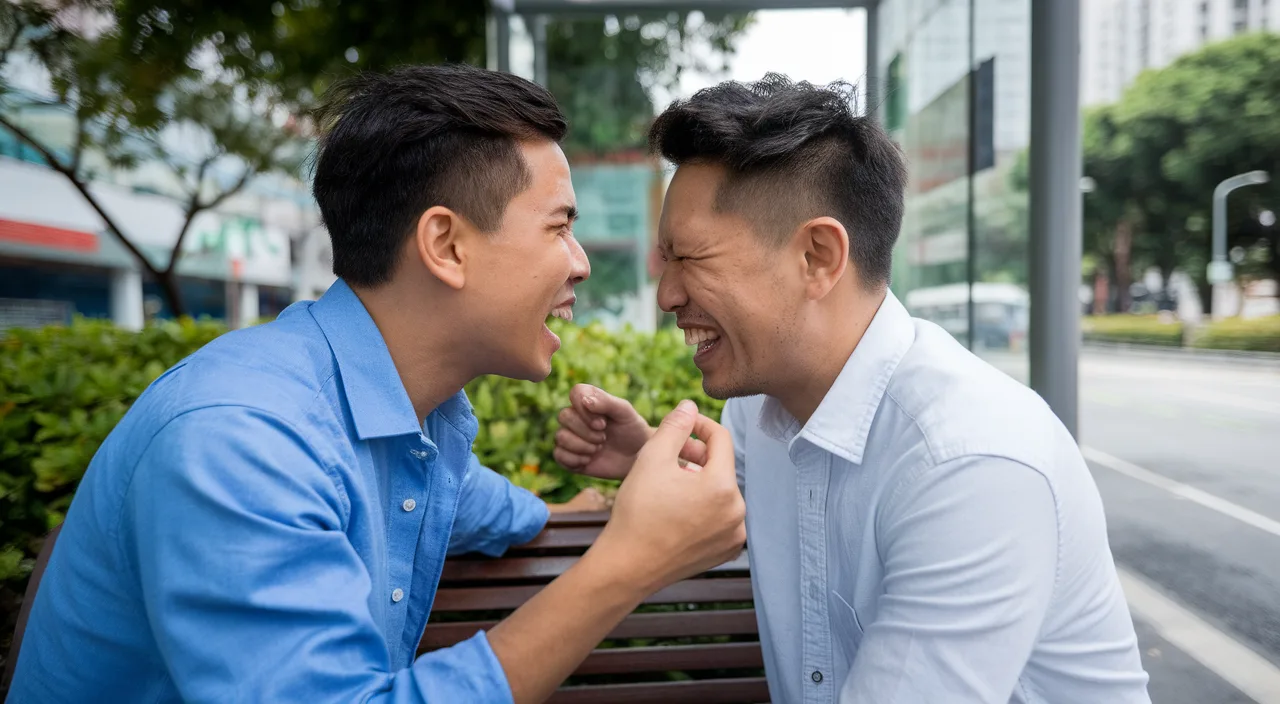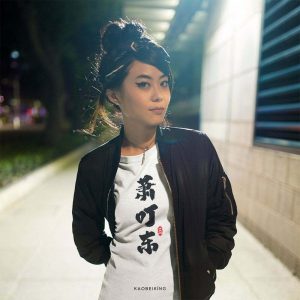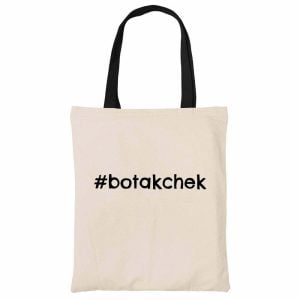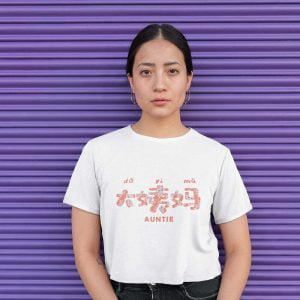What does ‘Jiak ba bo sai pang’ really mean, and how did it become Singapore’s ultimate argument resolver?
Jiak ba bo sai pang literally translates to ‘Eat already cannot shit’ in Hokkien, but its real power lies in its cultural meaning. This Singlish phrase serves as Singapore’s most effective way of telling someone to stop being uptight or overreacting. Whether you’re resolving disagreements about the best chicken rice stall or calming down friends during group project drama, this expression cuts through tension faster than ERP charges drain your wallet.
-
Chinese, KaoBeiKing, Quote, T-shirts, Typography
Price range: $30.00 through $38.00 Select options This product has multiple variants. The options may be chosen on the product page
TL;DR — Quick Summary
- Jiak ba bo sai pang means ‘Eat already cannot shit’ – crude yet quintessentially Singaporean.
- Used for resolving disagreements by dissolving tension through humor – the ultimate comedic mic drop.
- Gained popularity in hawker culture and online spaces, now essential for everything from family dinners to digital disputes.
- Represents Singapore’s unique approach to blending humor, pragmatism, and local language into powerful communication.
- Perfect example of how Singlish phrases can resolve arguments with minimal damage and maximum entertainment.
## Table of Contents
– Overview of Singlish Arguments
– History of ‘Jiak ba bo sai pang’ Phrase
– Common Usage in Singaporean Culture
– Real-Life Examples of Resolving Disputes
– Impact on Singaporean Society
Overview of Singlish Arguments
Singaporean disagreements have their own unique flavor that sets them apart from typical confrontations worldwide. Our arguments blend sarcasm, cultural references, and multiple languages into passionate yet oddly entertaining exchanges. From debating MRT crowd management to fighting over aircon remote control, these disputes often end not with dramatic conclusions but with perfectly timed Singlish phrases that leave everyone laughing.
Singlish arguments represent our cultural DNA – they’re part intellectual debate, part comedy roast, and completely local in their execution. Unlike formal English conflict resolution with its elaborate de-escalation techniques, we prefer efficiency through humor. In true kiasu Singaporean spirit, we neutralize drama with strategically deployed phrases like jiak ba bo sai pang, proving that laughter works better than lengthy mediation sessions.
These linguistic weapons serve multiple purposes: they acknowledge the absurdity of petty disputes, demonstrate cultural insider knowledge, and provide face-saving exits for all parties involved. When someone drops jiak ba bo sai pang mid-argument, they’re essentially saying everyone needs to chill out and remember what really matters.
-
Chinese, Chinese New Year, KaoBeiKing, T-shirts, Typography, Women
Price range: $30.00 through $38.00 Select options This product has multiple variants. The options may be chosen on the product page
History of ‘Jiak ba bo sai pang’ Phrase
The origins of jiak ba bo sai pang trace back to Hokkien-speaking communities where crude yet descriptive expressions flourished as everyday communication tools. This particular phrase began as literal commentary about digestive issues but evolved into a brilliant metaphor for emotional constipation – people who cannot let go of grudges or petty concerns.
Singapore’s kiasu culture, where holding onto arguments becomes almost competitive, provided perfect conditions for this phrase to gain deeper meaning. Our society’s tendency to debate everything from seat reservations to hawker center queues created countless opportunities for someone to point out when disputes became ridiculous through four powerful words: jiak ba bo sai pang.
The digital age accelerated this phrase’s popularity as online forums and social media platforms became new battlegrounds for Singaporean disagreements. Early internet users discovered that jiak ba bo sai pang could instantly defuse toxic online behavior, making it a go-to response for everything from comment section drama to workplace group chat tensions. From kopitiam conversations to viral memes, this expression achieved legendary status for being simultaneously insulting, solution-oriented, and hilariously effective.
Common Usage in Singaporean Culture
Jiak ba bo sai pang has embedded itself across every level of Singaporean social interaction, proving its versatility as the ultimate argument resolver:
- Kopitiam Culture: Uncles deploy this phrase mid-rant while sipping teh, instantly transforming heated debates into communal laughter.
- Digital Communication: Group chats rely on this expression to shut down drama queens and restore harmony among friends.
- Workplace Dynamics: Whispered behind cubicles to describe colleagues who obsess over minor issues, providing stress relief through shared understanding.
- Family Gatherings: Extended family disputes get diffused when younger relatives strategically drop this phrase to lighten tense moments.
- Public Transportation Debates: MRT etiquette arguments often end with someone muttering jiak ba bo sai pang about priority seating disputes.
This phrase has transcended its original context to appear on merchandise, social media content, and even casual conversation starters. Its cultural significance extends beyond mere humor – it represents our collective wisdom about choosing battles and maintaining perspective during conflicts.
Real-Life Examples of Resolving Disputes
Understanding jiak ba bo sai pang requires seeing it in action across various Singaporean scenarios:
1. The Bubble Tea Queue Incident:
Two customers argue over queue positions – one claims the other cut in line, while the accused insists they just returned from the restroom. As voices escalate and other patrons grow uncomfortable, an elderly uncle behind them loudly declares, ‘Aiyo jiak ba bo sai pang or what?’ Both disputants pause, recognize the absurdity of their situation, and end up laughing together. The phrase successfully transformed potential confrontation into shared amusement.
-
hashtag, KaoBeiKing, Quote, Singlish/Hokkien, T-shirts, Typography
Price range: $30.00 through $38.00 Select options This product has multiple variants. The options may be chosen on the product page -
KaoBeiKing, Parody, Singlish/Hokkien, T-shirts, Typography
Price range: $30.00 through $38.00 Select options This product has multiple variants. The options may be chosen on the product page
2. Office Project Management Drama:
A team member fails to complete their presentation slides, triggering extensive group chat complaints and blame assignment. Tension builds as deadlines approach and frustration peaks. One colleague casually types ‘jiak ba bo sai pang sia…’ into the conversation, immediately shifting the mood from accusatory to lighthearted. Even the most frustrated team members find themselves chuckling, allowing productive problem-solving to resume.
3. Family Dinner Disagreement:
Grandmother insists her curry needs more spice while uncle argues it’s already perfectly seasoned. Their voices compete with hawker center noise levels as other family members grow uncomfortable. A teenage cousin observes, ‘Wah both of you today jiak ba bo sai pang isit?’ Grandmother responds with mock indignation before breaking into laughter, effectively ending the culinary debate and restoring family harmony.
These examples demonstrate how jiak ba bo sai pang works through perfect timing, cultural understanding, and shared recognition of human foolishness in everyday disputes.
Impact on Singaporean Society
The widespread adoption of jiak ba bo sai pang as an argument resolver reflects deeper truths about Singaporean social values and communication preferences. This phrase represents our cultural commitment to resolving disagreements through humor rather than prolonged confrontation, demonstrating collective wisdom about preserving relationships over winning arguments.
Modern Singaporean discourse has been shaped by expressions like this that prioritize efficiency and face-saving solutions. We understand that sometimes ending disputes matters more than determining who’s right, and jiak ba bo sai pang provides the perfect tool for graceful exits from unnecessary conflicts.
Younger generations continue evolving this tradition through digital platforms, incorporating the phrase into memes, video content, and ironic merchandise. Social media has amplified its reach while maintaining its core function – reminding people not to take themselves too seriously during disagreements.
The phrase also demonstrates Singapore’s linguistic creativity, showing how multiple languages blend into powerful communication tools that capture complex cultural concepts. Jiak ba bo sai pang proves that crude origins don’t prevent expressions from becoming sophisticated social instruments for maintaining harmony.
Mastering the Art of ‘Jiak ba bo sai pang’: When and How to Use It
Successfully deploying jiak ba bo sai pang requires understanding your audience and timing. This phrase works best in informal settings among people who appreciate Singlish humor and understand cultural context. Avoid using it during professional meetings, legal discussions, or situations requiring serious conflict resolution.
Perfect timing involves waiting for disputes to reach peak absurdity before introducing this phrase as comedic relief. The goal is making everyone realize they’re arguing over trivial matters, not escalating tension or insulting participants. When used correctly, jiak ba bo sai pang transforms you into the group’s unofficial peacekeeper and comedy relief specialist.
Remember that this expression carries affectionate teasing rather than genuine insult when properly deployed. If recipients seem offended, remind them it comes from caring enough to prevent unnecessary stress over minor issues.
Frequently Asked Questions (FAQs)
What does ‘Jiak ba bo sai pang’ mean literally?
It means “Eat already cannot shit” in Hokkien — a sarcastic way to call someone uptight or overly stubborn.
Is it rude to say ‘Jiak ba bo sai pang’?
It can be cheeky, but among friends or in casual settings, it’s known to be more playful than offensive.
When should I use ‘Jiak ba bo sai pang’?
Use it during arguments that are getting ridiculous or over petty issues. It works best when aiming to lighten the mood.
Is ‘Jiak ba bo sai pang’ still relevant?
Absolutely. The phrase is still used widely in memes, everyday convos, and even online banter.
Can non-Singaporeans use it?
If they understand the context and use it with respect and humour, sure! Just don’t expect everyone to find it funny.
Are there other phrases similar to ‘Jiak ba bo sai pang’?
Yes, phrases like “Talk cock lah” or “Don’t so drama can?” are also used to dissolve tension in Singlish style.
Is this phrase offensive in formal settings?
Yes. Keep it out of professional situations unless your HR officer secretly also says “leh, lor, la” daily.








